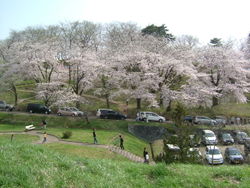
Akayu, Nanyo
Encyclopedia

Yamagata Prefecture
-Fruit:Yamagata Prefecture is the largest producer of cherries and pears in Japan. A large quantity of other kinds of fruits such as grapes, apples, peaches, melons, persimmons and watermelons are also produced.- Demographics :...
, Japan
Japan
Japan is an island nation in East Asia. Located in the Pacific Ocean, it lies to the east of the Sea of Japan, China, North Korea, South Korea and Russia, stretching from the Sea of Okhotsk in the north to the East China Sea and Taiwan in the south...
. Akayu is most famous for Akayu Onsen (赤湯温泉), a series of ryokan
Ryokan (inn)
A is a type of traditional Japanese inn that originated in the Edo period , when such inns served travelers along Japan's highways. They typically feature tatami-matted rooms, communal baths, and other public areas where visitors may wear yukata and talk with the owner.Ryokan are difficult to find...
famed for their natural hot-springs which are believed to have medicinal properties.
The town's name, which is literally translated as 'red hot water', derives from a story in 1093. It is said that the feudal chief of Tohoku Yoshitsuna Minamoto took a wounded soldier to a hot spring bath. His blood immediately turned the water red and the wound closed.
Eboshiyama Park (烏帽子山公園) is regarded as one of the top 100 cherry blossom viewing sites in Japan, and in 2000 an estimated 25,000 people came to the town in April to enjoy hanami
Hanami
is the Japanese traditional custom of enjoying the beauty of flowers, "flower" in this case almost always meaning cherry blossoms or ume blossoms. From the end of March to early May, sakura bloom all over Japan, and around the first of February on the island of Okinawa...
(花見, lit. "flower viewing") parties. The town also has an internationally recognised hang-gliding venue, the Sky Park, which hosted the Third Women's Hang Gliding Championships in 1993.
Akayu's most famous ex-resident is Toyotarō Yūki, a former governor of the Bank of Japan
Bank of Japan
is the central bank of Japan. The Bank is often called for short. It has its headquarters in Chuo, Tokyo.-History:Like most modern Japanese institutions, the Bank of Japan was founded after the Meiji Restoration...
, and the town has a museum devoted to his life.
Isabella Bird
English travel writer Isabella BirdIsabella Bird
Isabella Lucy Bird was a nineteenth-century English explorer, writer, and a natural historian.-Early life:Bird was born in Boroughbridge in 1831 and grew up in Tattenhall, Cheshire...
visited Akayu on her travels in Japan in 1878. In "Unbeaten Tracks in Japan" she wrote of Akayu:
the frequented watering-place of Akayu in the north, is
a perfect garden of Eden, "tilled with a pencil instead of a
plough," growing in rich profusion rice, cotton, maize, tobacco,
hemp, indigo, beans, egg-plants, walnuts, melons, cucumbers,
persimmons, apricots, pomegranates; a smiling and plenteous land,
an Asiatic Arcadia, prosperous and independent, all its bounteous
acres belonging to those who cultivate them, who live under their
vines, figs, and pomegranates, free from oppression--a remarkable
spectacle under an Asiatic despotism.
External links
- Akayu Onsen website Japanese

